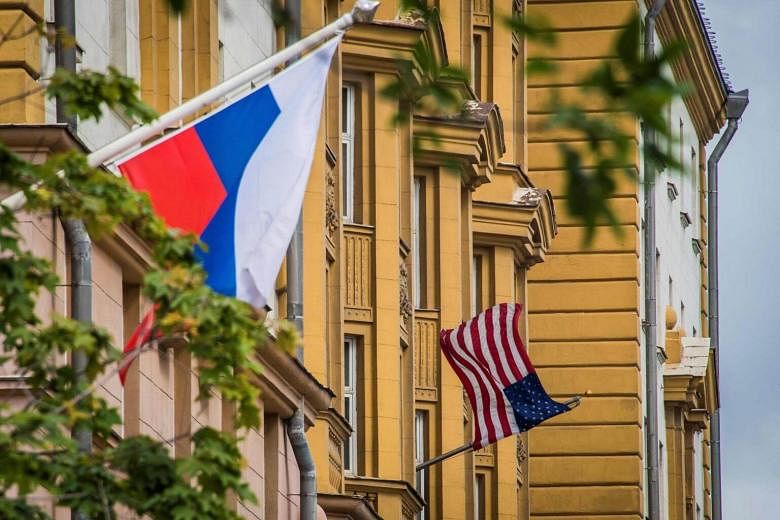WASHINGTON (WASHINGTON POST) - Every time there is news about the US investigation into alleged Russian interference in the US election, two issues are almost certain to crop up: the dossier and the uranium deal.
Here's a guide on what these two issues are all about:
WHAT IS THE DOSSIER?
The dossier is a collection of 17 memos concerning US President Donald Trump and Russia written by Christopher Steele, a former British intelligence officer, between June 20 and Dec 13, 2016. Steele produced his memos under a contract with Fusion GPS, a strategic intelligence firm run by former journalists.
The memos are written as raw intelligence, based on interviews Steele had with unidentified Russian sources (identified, for instance, as "Kremlin insider"), some of whom he paid for information. Raw intelligence is essentially high-grade gossip without the expectation that it would be made public unless it is further verified.
The memos, among other things, allege that the Russian government had been seeking to split the Western alliance by cultivating and supporting Trump and also gathering compromising information - "kompromat" - on him in an effort to blackmail him.
The memos, among other allegations, claim the Russian government fed the Trump campaign "valuable intelligence" on Hillary Clinton.
WHY IS IT IMPORTANT?
The dossier mirrors a separate conclusion by US intelligence agencies that the Russian government intervened in the US election in an effort to bolster Trump and harm Clinton, such as through hacking of the Democratic National Committee (DNC) and distributing materials to WikiLeaks to publish at key moments.
As the official declassified report stated: "We assess Russian President Vladimir Putin ordered an influence campaign in 2016 aimed at the US presidential election. Russia's goals were to undermine public faith in the US democratic process, denigrate Secretary Clinton, and harm her electability and potential presidency. We further assess Putin and the Russian Government developed a clear preference for President-elect Trump. We have high confidence in these judgments."
Russian President Vladimir Putin intensely disliked Clinton because he was convinced that when she was secretary of state, she had promoted anti-Putin, pro-democracy efforts in his country.
The FBI considered the information gathered by Steele to be of sufficient importance that it considered paying him for his research, although it later dropped the idea.
WHAT'S CONTROVERSIAL?
The White House has tried to use the connection between the dossier and Clinton to claim that this shows that rather than Trump colluding with Russia, Clinton colluded with Russia.
But that ignores the fact that DNC e-mails - as well as the e-mail account of the Clinton campaign chairman - were hacked and then published by WikiLeaks as part of the pro-Trump Russian operation identified by US intelligence agencies.
Steele started producing his memos in June 2016, about the same time that intelligence agencies began investigating possible ties between Russia and people close to Trump. The connection between Steele's research and official government investigations is murky, but for some Republicans it raises questions about whether the official probe begun in the Obama administration was influenced by information gathered by someone being paid by Democrats.
CNN, for instance, reported that the FBI used information in the Steele memos to obtain approval from the secret court that oversees the Foreign Intelligence Surveillance Act (FISA) to monitor the communications of Carter Page, who Trump had said was a key adviser on national security issues.
Presumably, the FBI had verified the information before it could cite it in court. Steele had quoted an "ethnic Russian close associate" of Trump as saying Page was an intermediary in "a well-developed conspiracy of cooperation" between the Trump campaign and the Russian leadership. Page has adamantly denied any wrongdoing.
Steele, during the campaign, at Fusion's direction also briefed reporters from some US news organisations, including The Washington Post, on his findings, according to court filings. Only one publication, Mother Jones, published information based on the briefing before the election.
WHAT IS THE URANIUM DEAL?
In 2010, Rosatom, the Russian nuclear energy agency, acquired a controlling stake in Uranium One, a Canadian-based company that had mining licences for about 20 per cent of US uranium extraction capacity. The agreement was approved by the Obama administration when Clinton was secretary of state.
Frank Giustra, a Canadian mining financier and a major contributor to the Clinton Foundation, had sold a company, UrAsia, to Uranium One in 2007. Individuals related to Uranium One and UrAsia, including Giustra, donated to the Clinton Foundation, totalling about US$145 million (S$198 million). Meanwhile in 2010, Bill Clinton received US$500,000 from a Russian bank to give a speech at a conference in Moscow.
Trump, during the campaign, tossed all of these separate facts together to falsely claim that Clinton "gave 20 per cent of our uranium - gave Russia for a big payment". But numerous fact checks have found no evidence for this claim. The original suggestion of wrongdoing was first raised in a book underwritten by an organisation headed by Stephen Bannon, a key adviser to Trump.
WHY IS IT IMPORTANT?
Whenever news about the Russia investigation heats up, the Trump White House cites the uranium deal in an effort to muddy the waters and suggest that Russia had gained something from Clinton in exchange for money. Trump himself has claimed the case is "Watergate, modern age."
But there is no evidence that Clinton was even informed about this deal. The Treasury Department was the key agency that headed the Committee on Foreign Investment in the United States which approved the investment; Clinton did not participate in the CFIUS decision. The deal was also approved by the Nuclear Regulatory Commission. Ultimately, only the president could have blocked or suspended the arrangement.
Moreover, no uranium produced at US mines may be exported, except for some uranium yellowcake which is extracted and processed in Canada before being returned to the US for use in nuclear power plants.

